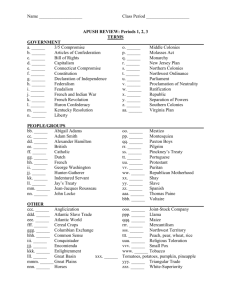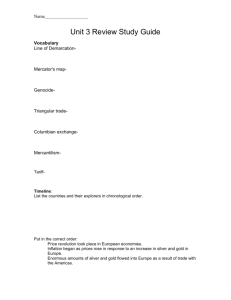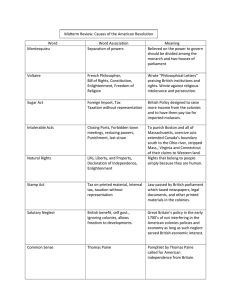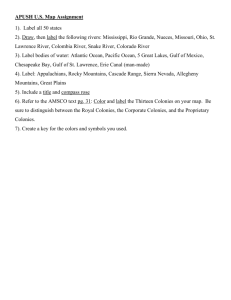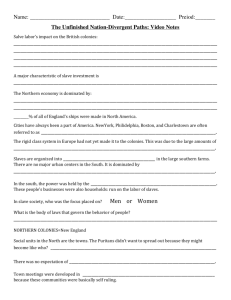Name Class Period APUSH REVIEW: Periods 1, 2, 3 ANSWER
advertisement
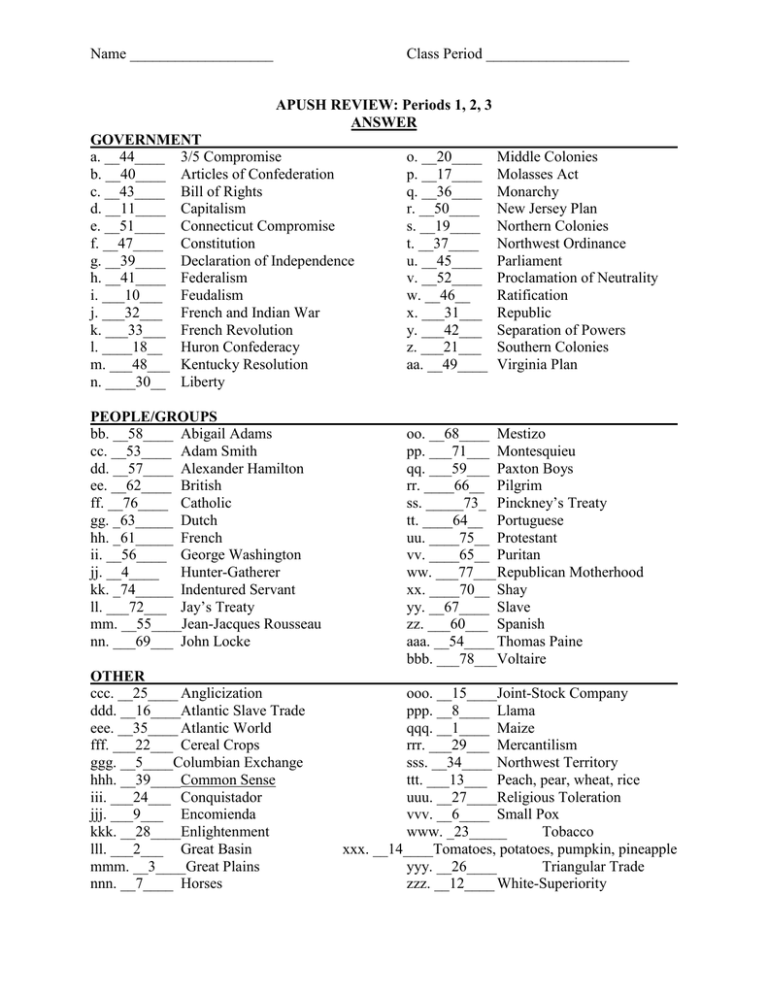
Name ___________________ Class Period ___________________ APUSH REVIEW: Periods 1, 2, 3 ANSWER GOVERNMENT a. __44____ 3/5 Compromise b. __40____ Articles of Confederation c. __43____ Bill of Rights d. __11____ Capitalism e. __51____ Connecticut Compromise f. __47____ Constitution g. __39____ Declaration of Independence h. __41____ Federalism i. ___10___ Feudalism j. ___32___ French and Indian War k. ___33___ French Revolution l. ____18__ Huron Confederacy m. ___48___ Kentucky Resolution n. ____30__ Liberty PEOPLE/GROUPS bb. __58____ Abigail Adams cc. __53____ Adam Smith dd. __57____ Alexander Hamilton ee. __62____ British ff. __76____ Catholic gg. _63_____ Dutch hh. _61_____ French ii. __56____ George Washington jj. __4____ Hunter-Gatherer kk. _74_____ Indentured Servant ll. ___72___ Jay’s Treaty mm. __55____Jean-Jacques Rousseau nn. ___69___ John Locke OTHER ccc. __25____ Anglicization ddd. __16____Atlantic Slave Trade eee. __35____ Atlantic World fff. ___22___ Cereal Crops ggg. __5____Columbian Exchange hhh. __39____Common Sense iii. ___24___ Conquistador jjj. ___9___ Encomienda kkk. __28____Enlightenment lll. ___2___ Great Basin mmm. __3____Great Plains nnn. __7____ Horses o. __20____ p. __17____ q. __36____ r. __50____ s. __19____ t. __37____ u. __45____ v. __52____ w. __46__ x. ___31___ y. ___42___ z. ___21___ aa. __49____ Middle Colonies Molasses Act Monarchy New Jersey Plan Northern Colonies Northwest Ordinance Parliament Proclamation of Neutrality Ratification Republic Separation of Powers Southern Colonies Virginia Plan oo. __68____ Mestizo pp. ___71___ Montesquieu qq. ___59___ Paxton Boys rr. ____66__ Pilgrim ss. _____73_ Pinckney’s Treaty tt. ____64__ Portuguese uu. ____75__ Protestant vv. ____65__ Puritan ww. ___77___ Republican Motherhood xx. ____70__ Shay yy. __67____ Slave zz. ___60___ Spanish aaa. __54____ Thomas Paine bbb. ___78___Voltaire ooo. __15____Joint-Stock Company ppp. __8____ Llama qqq. __1____ Maize rrr. ___29___ Mercantilism sss. __34____ Northwest Territory ttt. ___13___ Peach, pear, wheat, rice uuu. __27____Religious Toleration vvv. __6____ Small Pox www. _23_____ Tobacco xxx. __14____Tomatoes, potatoes, pumpkin, pineapple yyy. __26____ Triangular Trade zzz. __12____ White-Superiority Name ___________________ Class Period ___________________ APUSH REVIEW: Periods 1, 2, 3 TERMS GOVERNMENT a. ______ 3/5 Compromise b. ______ Articles of Confederation c. ______ Bill of Rights d. ______ Capitalism e. ______ Connecticut Compromise f. ______ Constitution g. ______ Declaration of Independence h. ______ Federalism i. ______ Feudalism j. ______ French and Indian War k. ______ French Revolution l. ______ Huron Confederacy m. ______ Kentucky Resolution n. ______ Liberty PEOPLE/GROUPS bb. ______ Abigail Adams cc. ______ Adam Smith dd. ______ Alexander Hamilton ee. ______ British ff. ______ Catholic gg. ______ Dutch hh. ______ French ii. ______ George Washington jj. ______ Hunter-Gatherer kk. ______ Indentured Servant ll. ______ Jay’s Treaty mm. ______ Jean-Jacques Rousseau nn. ______ John Locke OTHER ccc. ______ Anglicization ddd. ______ Atlantic Slave Trade eee. ______ Atlantic World fff. ______ Cereal Crops ggg. ______ Columbian Exchange hhh. ______ Common Sense iii. ______ Conquistador jjj. ______ Encomienda kkk. ______ Enlightenment lll. ______ Great Basin xxx. ______ mmm. ______ Great Plains nnn. ______ Horses o. ______ p. ______ q. ______ r. ______ s. ______ t. ______ u. ______ v. ______ w. ______ x. ______ y. ______ z. ______ aa. ______ Middle Colonies Molasses Act Monarchy New Jersey Plan Northern Colonies Northwest Ordinance Parliament Proclamation of Neutrality Ratification Republic Separation of Powers Southern Colonies Virginia Plan oo. ______ pp. ______ qq. ______ rr. ______ ss. ______ tt. ______ uu. ______ vv. ______ ww. ______ xx. ______ yy. ______ zz. ______ aaa. ______ bbb. ______ Mestizo Montesquieu Paxton Boys Pilgrim Pinckney’s Treaty Portuguese Protestant Puritan Republican Motherhood Shay Slave Spanish Thomas Paine Voltaire ooo. ______ Joint-Stock Company ppp. ______ Llama qqq. ______ Maize rrr. ______ Mercantilism sss. ______ Northwest Territory ttt. ______ Peach, pear, wheat, rice uuu. ______ Religious Toleration vvv. ______ Small Pox www. ______ Tobacco Tomatoes, potatoes, pumpkin, pineapple yyy. ______ Triangular Trade zzz. ______ White-Superiority Name ___________________ Class Period ___________________ APUSH REVIEW: Periods 1, 2, 3 Questions 1. A Large grain plant domesticated by indigenous peoples in Mesoamerica in prehistoric times. 2. Area of little rain, few trees, no large river, and few game. 3. Flat land with prairie grasses, trees along rivers, elk, and bison. 4. Nomadic tribes were most or all of the food obtained is from wild plants and animals. 5. Widespread transfer of animals, plants, culture, human populations, communicable diseases, technology and ideas between the Americas and Afro-Eurasian hemispheres in the 15th and 16th centuries. 6. Deadly communicable disease from Europe. 7. Domesticated animal from Europe 8. Only domesticated pack animal in the Americas 9. Legal system used by the Spanish crown during colonization to regulate Native-Americans and reward Spaniards. 10. Legal and military customs that structured society around holding land in exchange for service and labor. 11. An economic system in which trade, industry, and the means of production are largely or entirely privately owned and operated for profit. 12. The belief that Anglo-Saxons are superior to people of other racial backgrounds and that therefore whites should politically, economically, and socially dominate non-whites. 13. Food from Europe/Africa/Asia to the Americas 14. Food from the Americas to Europe/Africa/Asia 15. A business entity where different stakes can be bought and owned by shareholders 16. Slave trade from the 16th through to the 19th centuries. 17. British law that imposed a tax on sugar and rum imported from non-British foreign colonies into the North-America colonies 18. Five Iroquoian-speaking nations united to solve group problems 19. Rhode Island, New Hampshire, Massachusetts, and Connecticut 20. New York, New Jersey, Pennsylvania, and Delaware 21. Maryland, Virginia, North Carolina, South Carolina, Georgia 22. Primary crops from the New England region Name ___________________ Class Period ___________________ 23. Primary crop from the Chesapeake region 24. Spanish and Portuguese explorers/ soldiers 25. Transplanting British society onto new regions/ peoples 26. Trade among the Americas, Europe, and Africa 27. Within the First Amendment of the Bill of Rights 28. Era from which cultural and intellectual forces emphasized reason, analysis and individualism rather than traditional lines of authority. 29. A nation should export more than it imported and accumulate bullion to make up the difference. Exportation of finished goods favored. 30. Social and political freedoms guaranteed to all citizens 31. Power resides in the people, and the government is ruled by elected leaders run according to law 32. 1754 –1763: North American theater of the worldwide Seven Years' War. 33. Influential period of social and political upheaval that lasted from 1789 until 1799 34. Set aside in 1763 for Native Americas, organized incorporated territory 1787-1803 35. Interactions among the peoples/empires bordering the Atlantic Ocean rim from the 1450s on 36. A governmental system in which there is a hereditary head of state 37. Act of the Congress of Confederation creating the first organized territory from lands beyond the Appalachian Mountains 38. Challenged the authority of the British government and the royal monarchy in plain language that spoke to the common man 39. Document declaring the 13 colonies independent from Britain and part of the new Sovereign United States of America 40. Document signed amongst the thirteen original colonies that established the United States of America as a confederation of sovereign states and served as its first constitution 41. A political concept in which a group of members are bound together by covenant with a governing representative head. 42. Powers and responsibilities are divided among the legislative, executive, and judicial branches of government 43. First 10 amendments to the Constitution 44. Settled the issue over representation and taxation of free and enslaved persons Name ___________________ Class Period ___________________ 45. An assembly of representatives, usually of an entire nation, that makes laws 46. 9/13 states had to do this for this to be enacted 47. Rules and regulations forming the US government and guaranteeing rights to citizens 48. Argued that the states had the right and the duty to declare unconstitutional any acts of Congress that were not authorized by the Constitution 49. Representation should be population based- James Madison 50. Representation should be one per state- William Paterson 51. Established the House of Representatives based upon population and the Senate upon equal representation- Roger Sherman 52. May 1793, declares the US stance on the issues between England and France 53. Scottish social philosopher and political economist, author of The Wealth of Nations 54. English American writer whose Common Sense influenced the American Revolution 55. One of the most influential philosophers during the Enlightenment and author of The Social Contract 56. Their Farewell address warned of political parties and permanent military alliances 57. Wanted to establish a Bank of the US, pay off the war debt, and add tariffs 58. Their letters give eye witness accounts of the revolution and admonished the government to remember the women that helped fight for independence too 59. 1763, Scots-Irish frontiersmen in central Pennsylvania who formed a vigilante group to retaliate against Indians and marched to Philadelphia to present grievances 60. Took over what is now Central and most of South America and the Southwest US 61. Took over what is now Canada and most of the area west of the Appalachian Mountains 62. Took over what is now the Eastern Seaboard of the US 63. Took over what is now New York, New Jersey, Connecticut, and Pennsylvania 64. Took over what is now Brazil 65. A member of a group of Protestants within the Church of England, demanded the simplification of doctrine and worship, and greater strictness in religious discipline 66. Settlers who had fled the volatile political environment in England for Holland then went to the Americas, and maintained that their congregations needed to be separated from the Church of England 67. A person held in servitude as the chattel of another Name ___________________ Class Period ___________________ 68. A person of combined European and Native American descent 69. English philosopher and physician, one of the most influential of Enlightenment thinkers, known as the "Father of Classical Liberalism" 70. Led a group of rebels against Massachusetts courts and later the United States' Federal Armory in an unsuccessful attempt to seize its weaponry and overthrow the government. 71. French lawyer, man of letters, and political philosopher who espoused the separation of powers. 72. Between Britain and the US that is credited with averting war, resolving issues remaining since Revolutionary War, and facilitated ten years of peaceful trade 73. Established intentions of friendship between the US and Spain, defined the boundaries of the US and Spanish colonies and guaranteed US navigation rights on the Mississippi 74. A labor system whereby people paid for their passage to the New World by working for an employer for a certain number of years 75. The majority of Colonial settlers were of the __________ branch of Christianity 76. Excluded from most colonies those of the ____________ branch of Christianity were allowed in Maryland 77. A concept that deals with the role of women and their duties to both family and country at the time of the American Revolution. 78. French Enlightenment writer, historian and philosopher, believed in the separation of church and state.
